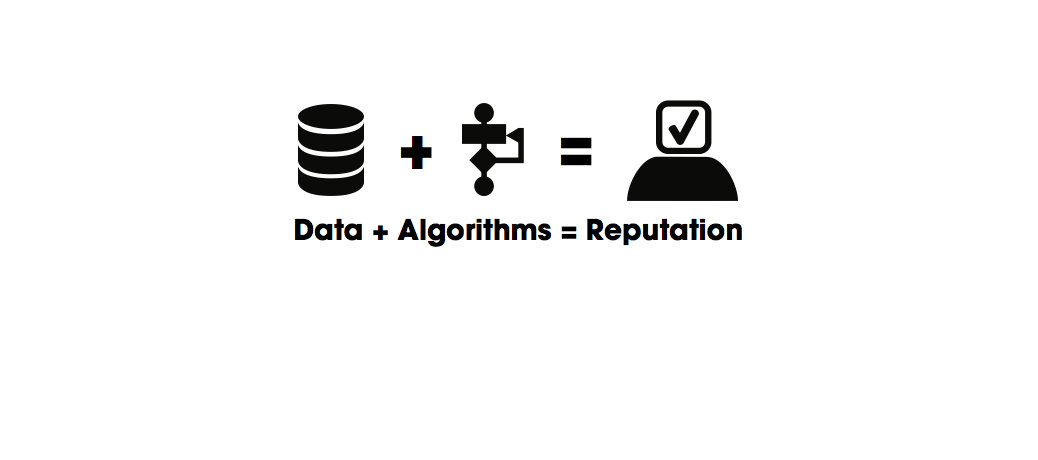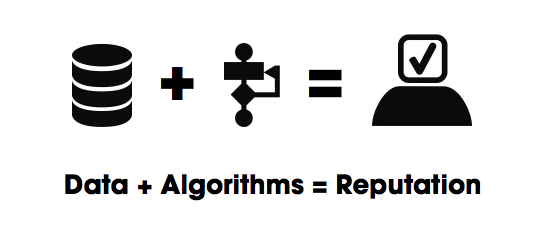Why does a parent fear what a teenager could share on social networks and what long term consequences this could lead to in her adult life? It’s not a parenting problem, it’s a technological one. Our fear is derived by the lack of control, and our lack of control is caused by the strange deal we make to keep our social networks free. It’s time to change all that: by reclaiming our reputation.
A parent asked me for advice a week ago: his 11 yo daughter wants to open a public profile on a social network and he is concerned because this profile will represent her living resume, through this profile she will build her persona, her image and her reputation from now on.
This parent is not only concerned, but also well informed. As a marketer he’s already thinking about how her profile will look when it will be analyzed by potential recruiters, how it will look to universities that will screen her, how – all together – her current digital actions will influence the rest of her life.
A friend of his, who is also in the marketing field, suggested to develop a social media marketing plan for the child and teach her how to win at the game of social media. She should grow to become a social star.
This seems like the prefect approach for the 20-teens: parents optimize kids names in order to make them unique on Google thus insuring them a good head start in a lifetime of SEO work, why shouldn’t they strategize the debut of their kid on social networks?
I’m not ready to accept SEO optimized kids with pre-planned social media strategies. I would tend to resist to this trend.
We care for what our kids could share because we are sincerely worried. Yet we do nothing to go at the core of the problem. The problem is: why on earth are we scared? And the answer is quite simple: because we are not in control of our social profiles. And why aren’t we in control? For two reasons: because of who, how and where our data is stored and because of how it is manipulated by algorithms.
Data
We are worried about what we share because what we share is here to stay. Sometimes we can have a degree of control over it because we choose what to upload, sometimes other people share also on our behalf. Sometimes we have the illusion that we are able to control the amount of access that our social graph has to certain information. At other times we even have the delusion that we can delete stuff.
The reality is that – since keeping data stored is way more economical than selectively deleting it – our data may as well survive both us and the businesses that manage it.
What we can do in regards to data is limited, but can be effective. In case of doubt we can refrain from uploading that photo, not share that thought or that link.
Once we do share anything we need to be conscious that the information will remain in our orbit for very long. Why? Because of the algorithm.
Algorithm
Algorithms crunch the data and develop our representation, our graph. Algorithms express our reputation. Algorithms are where the money is made. Algorithms we don’t control. At all.
We have become accustomed to a strange way of dealing with our identity. We give it away, for free, to the biggest aggregator (in the current days Facebook), in turn we get advertised at and to keep us happy we are left to play with (not particularly good) communication tools.
What we should better appreciate is that the algorithms work all the time. The algorithms remember and connect the steps that we think are random. Algorithms can search through our timeline, connecting seemingly unrelated dots. After we have deleted stuff the zealous algorithms can keep in their huge memories meta-information about that stuff. The data may be lost, but the algorithm’s evaluation of it will never be.
Algorithms run our world. And they will gain power in the future. My friend’s daughter will be evaluated through her social profiles. But her social profiles will not be analyzed by a person, rather by a powerful algorithm.
But this is not how it has to end.
Reclaim the data, open the algorithm
At this point I would like to give some sound, actionable, parenting advice to my friend, but it seems I’m far away from making any sense of the social media dilemma of his 11 yo daughter.
If I suggested to use the new breed of social networks like friendika, diaspora or app.net, that solve the issues at hand, I would be ignoring the first rule of being a 11 yo: you want to be where your friends are. The teen will open a facebook account, there is no doubt about it.
So what can a concerned parent do today? Not much, apart from parenting. The issue at hand can be solved at a global consensus level, but not at an individual level. We should explain the world of data and the power of algorithms to the people around us. At the same time we should collectively reclaim the data and open source the algorithm.
Reclaiming the data is simple: we need to store the data in silos that we control. How do we gain that control? No revolution is necessary. We just need to pay for those silos that store our data with our own money. When we become the owners of our data we will gain control over it.
The companies that wish to thrive on our data will need to ask permission to access it and pay for this access. The model based on free-data-storage/free-use-of-the-network with advertising on top is giving up a meaningful transaction: I want control of my data and I am available to pay for that control. The social network wants access to my data and should be ready to pay for it.
After gaining control of the data we should open source the algorithm. As “customers” of social networks we should not allow the companies that run them to keep their algorithm secret. It should be open source, peer reviewed, it should pass the collective test of geek programmers, privacy advocates, free speech activists and zealous lawyers. It should be open, transparent and publicly available.
The technology world already has the antidotes and the language to win this important battle: the open source movement has spent years defining the landscape, helping us build a vocabulary and telling powerful (success) stories that have become Apache, Mozilla, Linux, WordPress.
We are ready to pay for storing our data (it start to happen in quite a large scale in the case of app.net) and we have all the tools to open source the algorithm.
Reclaim your reputation
Imagine the end of the current anxiety and fear over what happens of our social profiles. We deserve to have control, while at the same time we enable companies to thrive by transacting with us. This beautiful, virtuous model of openness and transparency is already happening. We need more people thinking about this and we need to start this conversation with the Facebooks, Googles, Amazons, Apples and Microsofts in order to help them get their (now common) business model right.
The end result will be end this state of fear and will find us sharing, in the commons, with the knowledge that our reputation is handled with fairness by a shared, agreed upon algorithm.
The debate about reputation and identity continues at OUT as YOU.
Credits:
Check Box designed by Cris Dobbins from The Noun Project
Database designed by Cees de Vries from The Noun Project


